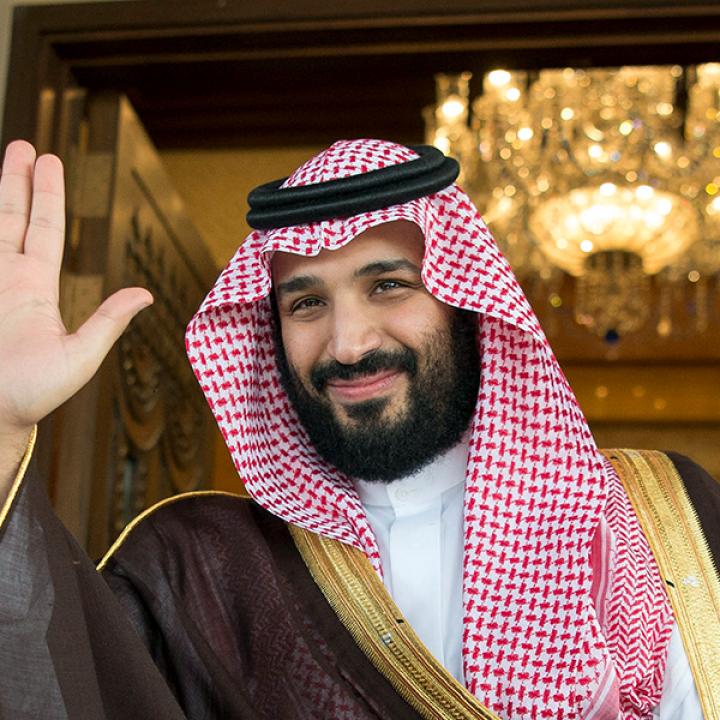
- Policy Analysis
- Policy Alert
Saudi Cabinet Changes: The 'March of Modernization'?

The raft of new appointments reflects the crown prince’s vision of transforming the economy, but a simultaneous statement about recent arrests shows the limits on political freedom.
On June 2, Saudi Arabia issued twenty-seven royal orders that Information Minister Awwad bin Saleh al-Awwad described as “part of the march of modernization and renaissance being witnessed in the kingdom under the leadership of King Salman and Crown Prince Muhammad bin Salman.” Among the orders were new cabinet appointments elevating individuals who are seen as allies of the crown prince, the king’s thirty-two-year-old favorite son widely known as MbS.
Later that day, however, the Office of Public Prosecution issued a seemingly cryptic statement about the recent arrest “of a number of persons after monitoring their coordinated activity and organized action to undermine the security and stability of the Kingdom, its social peace and national unity.” The accused allegedly admitted that they had communicated and cooperated with individuals and organizations hostile to the kingdom; recruited persons in a sensitive government entity to obtain confidential information and official documents to harm the higher interests of the kingdom; and provided financial and moral support to hostile elements abroad.
Yet the statement’s details reveal the true intent behind the detentions: “Seventeen individuals have been arrested in this case. Temporary release orders were issued for eight suspects, five women and three men, until the completion of their procedural review. Nine individuals, five men and four women, are still under arrest.” The gender descriptions and a reference to a May 18 statement from the Presidency of State Security confirm that the case involved the recent detention of several women activists who have campaigned for the right to drive, among other issues. That right is due to be granted beginning on June 24, following a decree by King Salman last year.
The cabinet appointments likewise reveal the limits on expanding Saudi gender equality: none of the eighteen new ministers are women. The countdown to the imminent driving reform could prompt further government efforts to balance the new right with opposition from conservative social elements. Last week, the kingdom introduced a law banning sexual harassment, another change for which the activists had campaigned. The legislation was previously opposed because it would have encouraged gender mixing, but it is now deemed necessary to prevent men from harassing women drivers. These shifting steps indicate that modernizing Saudi Arabia may not be a march so much as a careful dance.
The cabinet shuffle also hints at the general direction that Riyadh’s reform agenda may take in the coming months, since all of the new ministers appear to be technocrats aligned with the crown prince’s economic vision. The list includes only one royal family member, Prince Badr bin Abdullah bin Farhan, who is from a peripheral part of the House of Saud but is seen as a close ally of MbS. He has been named minister of culture, a new portfolio that was previously part of the Information Ministry. Prince Badr accompanied the crown prince on his recent trips to the United States and Europe. (Interestingly, he was also the royal who purchased the Leonardo da Vinci painting “Salvator Mundi” last year for a whopping $450 million, an incident that raised controversy not only for the price tag, but also because the painting wound up in an Emirati museum.)
Other new appointments include Ahmed al-Rajhi, a scion of a prominent banking family, at the Ministry of Labor and Social Development, and Abdullatif al-Asheikh, a moderate cleric who headed the religious police under King Abdullah, at the Ministry of Islamic Affairs. Sheikh Saleh bin Abdulaziz bin Muhammad al-Asheikh has been named a new minister of state; in that capacity he will also join the Council of Political and Security Affairs, a top decisionmaking body. The remaining appointments include new deputy ministers for interior, energy, telecommunications, and transport, as well as new leadership for two key organizations: the King Abdullah City for Atomic and Renewable Energy (KACARE), and the Royal Commission for Jubail and Yanbu, a body tasked with overseeing economic initiatives in those two industrial cities. A new royal commission for the holy city of Mecca was announced as well, along with a new body to protect historical areas in Jeddah and a new council for natural reserves “to protect wildlife and stimulate ecotourism.”
Simon Henderson is the Baker Fellow and director of the Gulf and Energy Policy Program at The Washington Institute.

